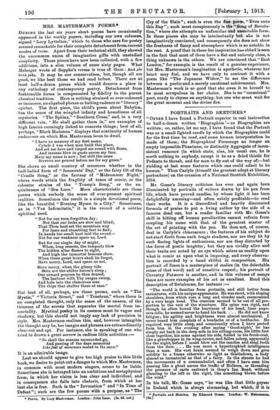MRS. MASTERMAN'S POEMS.* DuniNo the last six years short poems
have occasionally appeared in the weekly papers, including our own columns, signed " Lucy Lyttelton," which to those who care for poetry seemed remarkable for their complete detachment from current modes of verse. Apart from their technical skill, they showed the uncommon union of imaginative gifts with unstudied simplicity. Those pieces have now been collected, with a few
additions, into a slim volume of some sixty pages. What .Meleager wrote of Sappho's verses is true of them : Bala Fir a Axa 1548a. It may be our conservatism, but, though all are
good, we like best those we had read before. There are at least half-a-dozen pieces which would deserve a place in any anthology of contemporary poetry. Detachment from fashionable forms is compensated by fidelity to the purest classical tradition. Here is nothing strained or over-coloured or insincere, no slipshod phrase or halting cadence or " literary " epithet. The first piece, the child's poem about Babylon, has the sense of the mingled infinity and homeliness of all mysteries. "The Sphinx," "Southern Cross," and, in a very different vein, "He shall gather them in," are examples of high fancies cunningly linked to concrete things ; best of all, perhaps, "Black Madonna" displays that continuity of human endeavour on which Mrs. Masterman loves to dwell.
" I have no memory of my first name, Cybele I was when men built this place,
And set me here and ringed me round with flame, And incense blew in gusts across my face.
Mary my name is now ; but still the same
Sorrows are poured before me for my grace."
She shows no small mastery of measures whether in the half-ballad form of " Innocents' Day," or the fairy lilt of the "Cradle Song," or the fantasy of "Midsummer Night," where words attain the fragility of tones of music, or the robuster strains of the " Tramp's Song," or the ex- quisiteness of "Sea Lure." More characteristic are those Poems which embody the sense of ever-present spiritual realities. Sometimes the result is a simple devotional poem, like the beautiful "Evening Hymn in a City." Sometimes, as in " Vox Infirmitatis," it is the record of a subtler spiritual need.
" Not for our soon-forgotten day ;
Not that our looks are slow and blind; That Thou bast set the mountain way For lame and stumbling feet to find ; In hands too small hast laid the sword— Not for our weakness spare us, Lord.
But for our single day of might, When, long remote, the tempests blow The hidden altar flames to sight, And high the immortal beacons show. When these great hours shall lie forgot, Have mercy, Lord, and spare us not.
Have mercy, when the glassy tide Stirs not the stiller haven's sleep ; Our coward prayers be then denied, The harbour with Thy surges sweep, And hale into the clamorous seas The ships that shelter there at ease."
But best of all, perhaps, are those poems, such as "The Mystic," " Victoria Street," and " Tenebrae," where there is no completed thought, only the sense of the unseen, of the thinness of the screen that separates the mortal from im- mortality. Mystical poetry in its essence must be vague and shadowy, but this should not imply any lack of precision in style. Mrs. Masterman realizes this, and, however intangible the thought may be, her images and phrases are extraordinarily clear-cut and apt. For instance, she is speaking of one who tried to drown a great sorrow in endless little activities :-
" So shall the seasons unrecorded go, And passing of the days memorial Like feet of mourners muted in the snow."
It is an admirable image.
Lest we should appear to give too high praise to this little
book, we desire to point out a danger to which Mrs. Masterman, in common with most modern singers, seems to be liable. Sometimes she is betrayed into an ambitious and metaphysical form, in which her vision is less clear and individual, and in consequence she falls into rhetoric, from which at her best she is free. Such is the" Invocation " and "In Time of Defeat "; such are the few poems with a purpose, as " The • Poems, By Lucy liastarman. Loudon : John Lane, L3e. Bd. net.] Cry of the Slain" ; such is even the fine-poem, "Even unto this Day "; such most conspicuously is the "Song of Revolu- tion," where she attempts an unfamiliar and unsuitable form. In these pieces she may be intellectually but she is not imaginatively convinced, and consequently she does not show the freshness of fancy and atmosphere which is so notable in the rest. A proof that in these her inspiration has ebbed is seen in the fact that most of them have a flat and unlovely close, a thing unknown in the others. We are convinced that " East London," for example, is the result of a genuine experience, but Mrs. Masterman's imagination is apathetic, whatever her heart may feel, and we have only to contrast it with a poem like "The Japanese Widow," to see the difference between a poetic and a merely emotional achievement. Mrs. Masterman's work is so good that she owes it to herself to be most scrupulous in her choice. She is no "occasional" poet, ready to rhyme on anything, but one who must wait for the great moment and the divine fire.










































 Previous page
Previous page